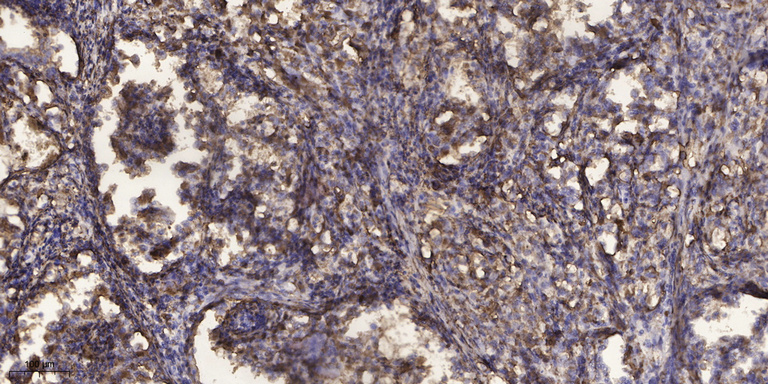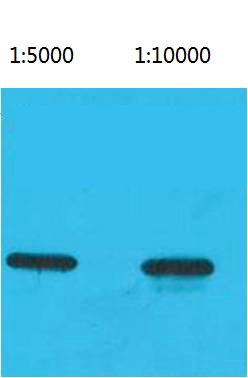PROZ rabbit pAb
- Catalog No.:YT7866
- Applications:WB;IHC
- Reactivity:Human;Rat;Mouse;
- Target:
- PROZ
- Gene Name:
- PROZ
- Protein Name:
- PROZ
- Human Gene Id:
- 8858
- Human Swiss Prot No:
- P22891
- Mouse Gene Id:
- 66901
- Mouse Swiss Prot No:
- Q9CQW3
- Immunogen:
- Synthesized peptide derived from human PROZ AA range: 141-190
- Specificity:
- This antibody detects endogenous levels of Human PROZ
- Formulation:
- Liquid in PBS containing 50% glycerol, 0.5% BSA and 0.02% sodium azide.
- Source:
- Polyclonal, Rabbit,IgG
- Dilution:
- WB 1:500-2000;IHC 1:50-300
- Purification:
- The antibody was affinity-purified from rabbit antiserum by affinity-chromatography using epitope-specific immunogen.
- Concentration:
- 1 mg/ml
- Storage Stability:
- -15°C to -25°C/1 year(Do not lower than -25°C)
- Other Name:
- Vitamin K-dependent protein Z
- Molecular Weight(Da):
- 44kD
- Background:
- This gene encodes a liver vitamin K-dependent glycoprotein that is synthesized in the liver and secreted into the plasma. The encoded protein plays a role in regulating blood coagulation by complexing with protein Z-dependent protease inhibitor to directly inhibit activated factor X at the phospholipid surface. Deficiencies in this protein are associated with an increased risk of ischemic arterial diseases and fetal loss. Mutations in this gene are the cause of protein Z deficiency. Alternate splicing results in multiple transcript variants. [provided by RefSeq, Jan 2012],
- Function:
- caution:Although homologous with the vitamin K-dependent clotting factors, it has lost two of the essential catalytic residues and has no enzymatic activity.,function:Appears to assist hemostasis by binding thrombin and promoting its association with phospholipid vesicles.,PTM:The iron and 2-oxoglutarate dependent 3-hydroxylation of aspartate and asparagine is (R) stereospecific within EGF domains.,similarity:Belongs to the peptidase S1 family.,similarity:Contains 1 Gla (gamma-carboxy-glutamate) domain.,similarity:Contains 1 peptidase S1 domain.,similarity:Contains 2 EGF-like domains.,tissue specificity:Plasma.,
- Subcellular Location:
- Secreted.
- Expression:
- Plasma.
- June 19-2018
- WESTERN IMMUNOBLOTTING PROTOCOL
- June 19-2018
- IMMUNOHISTOCHEMISTRY-PARAFFIN PROTOCOL
- June 19-2018
- IMMUNOFLUORESCENCE PROTOCOL
- September 08-2020
- FLOW-CYTOMEYRT-PROTOCOL
- May 20-2022
- Cell-Based ELISA│解您多样本WB检测之困扰
- July 13-2018
- CELL-BASED-ELISA-PROTOCOL-FOR-ACETYL-PROTEIN
- July 13-2018
- CELL-BASED-ELISA-PROTOCOL-FOR-PHOSPHO-PROTEIN
- July 13-2018
- Antibody-FAQs
- Products Images

- Immunohistochemical analysis of paraffin-embedded human Squamous cell carcinoma of lung. 1, Antibody was diluted at 1:200(4° overnight). 2, Tris-EDTA,pH9.0 was used for antigen retrieval. 3,Secondary antibody was diluted at 1:200(room temperature, 45min).



